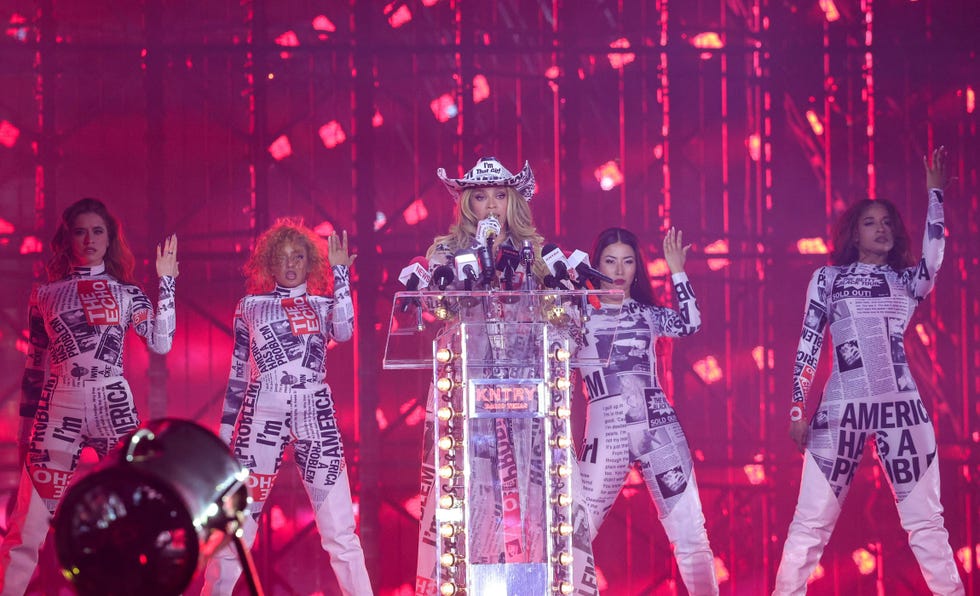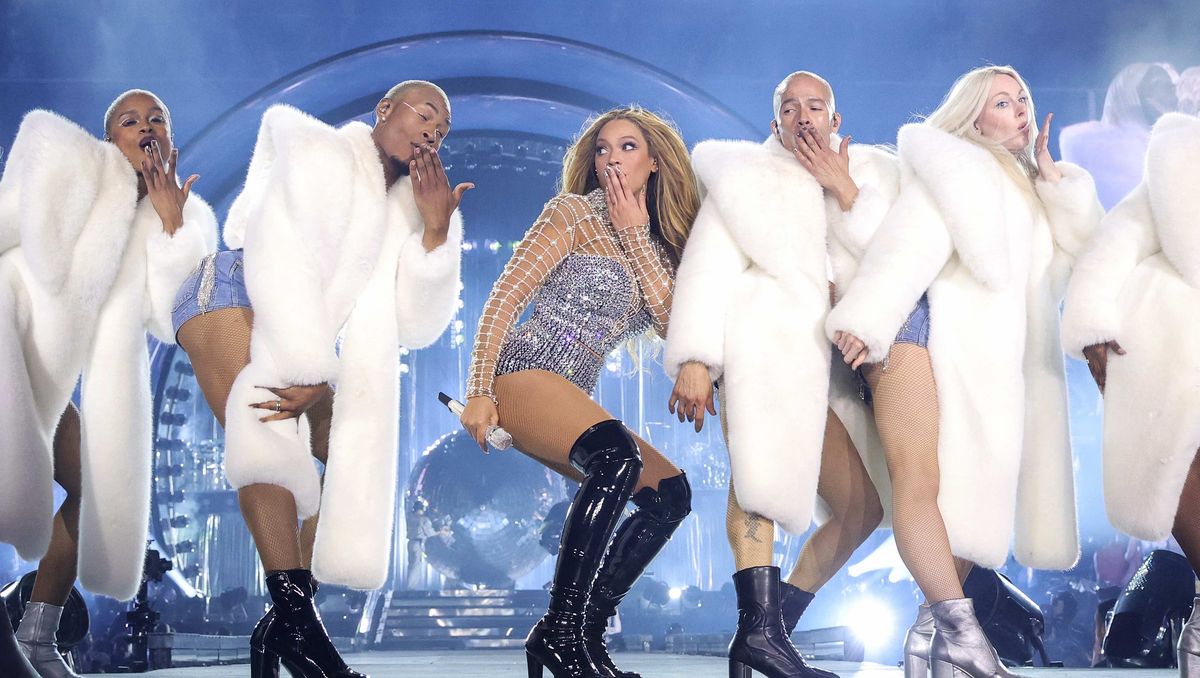Beyoncé’s Cowboy Carter Tour Is a Reminder That Black Art—and History—Can’t Be Erased


When Beyoncé initially announced the Cowboy Carter and the Rodeo Chitlin’ Circuit Tour on the very first day of Black History Month, I immediately began to wonder how she planned to meet this moment in history. So much had changed in the past year since she first released the album itself. Many of her fans, myself included, were still trying to process the truths that the 2024 presidential election affirmed about America, only to be met in the new year with an onslaught of executive orders, natural disasters, plane crashes, deportations, and tariffs.
The news cycle was so bleak that Beyoncé’s tour announcement, and the overdue Album of the Year Grammy win she nabbed a few days later, felt like the first bits of positivity all year. The Grammy wins for Cowboy Carter, especially, were so satisfying. Music’s biggest award show was giving its highest honor, as well as the Best Country Album award, to a project that received so much backlash simply because Beyoncé dared to defy genres and infuse country music motifs into her sound. Critics and the country music community reacted as if a Black woman born and raised in Houston, Texas, had no claims to the culture or sound she grew up with. As if enslaved Africans didn’t create the banjo and use washboards and bone castanets to try and emulate the music of their homelands with whatever was available. As if Ray Charles, Charley Pride, and Linda Martell never existed.
It’s almost too on-the-nose how much the rejection she received mirrors the rejection Black women are currently feeling in America. Both the country and its namesake genre have gone above and beyond to downplay, shut out, or outright erase the fundamental ways Black people contributed to their origin. We saw it in the way the Country Music Awards completely shut out the Cowboy Carter album. And we’re seeing it now in the various attempts to gut all things dedicated to diversity, equity, and inclusion, and to censor our libraries and museums.
So as I walked into So-Fi Stadium for Beyoncé’s fifth and final L.A. tour date—a record-breaking run that spanned two weeks—I was excited to see how the greatest performer of our time would set the stage for these parallels to converge.
Like the album itself, the Cowboy Carter Tour doesn’t take long to let you know what it’s trying to say. Opening with the LP’s first two tracks, “American Requiem” and “Blackbiird,” it’s like Queen Bee is holding her own sort of mass for our divided states. She comes straight out of the gate with messages like, “Nothing really ends, for things to stay the same they have to change again,” “Take these broken wings and learn to fly,” and “You were only waiting for this moment to be free,” that address the elephant in the room and hold space for our collective emotions. This feeling is only heightened as she mixes in “The Star-Spangled Banner” with her cover of “Blackbird,” a Beatles song Paul McCartney wrote as a message of hope and encouragement to Black people during the Civil Rights Movement.
“Here’s Beyoncé marching down the catwalk of the stage, stomping out any and all notions of defeat with each step.”
As she sings alone on stage, a visual of the her sitting in front of a large tattered American flag with gaping holes appears on the massive panoramic LED screen behind her, then a bold message flashes into view as she holds the song’s final note: “Never ask permission for something that already belongs to you.”
Before you can fully register what’s happening, the beat to “Freedom” drops, a song from her Lemonade album that also soundtracked Vice President Kamala Harris’s presidential campaign videos and rallies. Its placement at the end of the medley of ballads shifts the entire energy in the stadium. Now here’s Beyoncé marching down the catwalk of the stage, stomping out any and all notions of defeat with each step.

Then, as the song ends, another image of Bey appears on the big screen; this time she’s wearing nothing but the pageant-like sash she wears on the Cowboy Carter album cover, except this time the message reads: “The Reclamation of America.”
In this moment, it’s crystal-clear we’re not just experiencing a concert, we’re in the midst of a revival. Before getting to the big dance numbers, stunts, props (a golden mechanical bull, flying car, and giant horseshoe awaited), and custom couture costume changes, Beyoncé was making a pointed effort to refuel our spirits and remind us of our power. Without missing a beat, she takes us right into a spirited performance of “Ya Ya,” perhaps Cowboy Carter’s most direct critique of the country at this moment in time. Visuals of the issues discussed in the song (pay inequality, wildfires, floods, freedom marches) flash across the screen to the beat, as well as poignant lyrics like, “history can’t be erased.”
To close out this portion of the show, a series of video clips that feel like a short film you’d see projected in a museum begin to play on the screen as the stadium goes dark. Scenes from various facets of Black culture fill the screen: Black cowboys, country musicians, gospel choirs, jazz bands, dance parties, family gatherings; performance footage from greats like James Brown, Nina Simone, Chuck Berry, and Tina Turner; and clips of Beyoncé through the years. Then, the montage cuts to footage of talking heads on cable news (their faces blurred out) who criticized the singer’s foray into country music. The video concludes with a visual of Beyoncé turning a stack of TVs off before reappearing on stage to perform “America Has a Problem” and, the song whose music video launched #BoycottBeyoncé, “Formation.” The mother of three is holding no punches at this point. She sees the parallels, and she’s calling them out one by one.
Political messages continue to be sprinkled throughout the entirety of the show, but it’s really in the first 30 minutes (yes, all of this happened that quickly!) of the almost three-hour show that Beyoncé’s state of the union message is clearest. Donning cowboy motifs and American flag-patterned fabrics throughout, she is the picture of a citizen loving and critiquing her home at the same time. She stands two-boots-on-the-ground down in the truth that both things are possible—and necessary—when you are from a country that was built by your ancestors, but not for them.
“It cannot be denied that Black art is revolutionary.”
If part of Renaissance’s mission was to uplift us post-pandemic, I’d argue that this second act is here to embolden us as we embark on the difficult road ahead. The Cowboy Carter Tour reinforces the power we have to use our voice and our gifts to protect ourselves and our culture in ways that cannot be touched.
I’m sure some critics will write off these moments in the show as symbolic activism, or note ways Beyoncé could be doing more (despite the millions of dollars in charity she donates annually). Some valid points might be made, and (not but) it cannot be denied that Black art is revolutionary. Much like Kendrick Lamar’s Super Bowl Halftime Show, it stands as a powerful reminder that no amount of effort can erase us from the fabric of American culture.

elle





